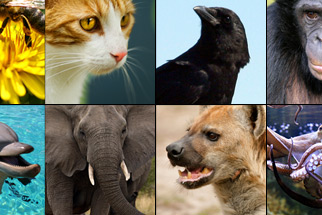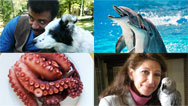Your Favorite Smart Animal
- By Susan K. Lewis and Melissa Salpietra
- Posted 08.12.10
- NOVA scienceNOW
Which is "smarter"—a dog, a cat, a bonobo, or an octopus? Experts on animal cognition tend to bristle at the notion of ranking different species. Each creature, they'll argue, has brain-processing powers that allow it to thrive in its own ecological niche. Yet the experts we spoke to still had their favorites, and you may have yours. Listen in as they briefly pitch the merits of various animals, then vote for your favorite.
 Launch Interactive
Launch Interactive
Hear experts "pitch" for dogs, cats, honeybees, hyenas, and other smart species, then vote for your favorite.
Transcript
Your Favorite Smart Animal
BONOBOS
Vanessa Woods
Woods is a research scientist at Duke University and the author of Bonobo Handshake, a memoir of her fieldwork with bonobos in the Congo. Her specialty is bonobo and chimpanzee emotions and cognition.
Woods: I think bonobos are actually the most intelligent ape, I even think that they are smarter than humans, because they have been able to do something that we—for all our gigantic brain and all our cognition—have still not managed to do, and that is to live peacefully.
Intelligence can take many different forms. So there is intelligence in terms of cognition, as in what you have to do in order to solve a particular task. But then there is also emotional intelligence. And I think that is something we can really learn from bonobos.
For the last 40 years we've been looking at chimpanzees and chimpanzee cognition in order to tell us about ourselves. And you know chimpanzees are wonderful, but just like us, they also have this dark side. So they hunt each other; they kill each other; they have war. They beat their females; they kill their infants. So they're a reflection of ourselves.
But bonobos, who are equally related to us, they have something that we don't. They have a way to maintain peace in their groups. So for them it's sex. They use sex as a mechanism to dispel tension. And we really need to find out more about the psychological and emotional lives of bonobos so that we can learn how to do the same thing. And for us, I don't think it's going to be sex. I don't think we are going to be having sex with each other to maintain peace. But there is something that bonobos do, and there is a secret to them, and we really need to learn it.
CATS
Nicholas Dodman
Dodman is the Director of the Animal Behavior Program at the Tufts Cummings School of Veterinary Medicine. His specialty is the behavior of domestic animals, particularly dogs and cats.
Dodman: Cats are not just creatures that lay around on a pillow in the sun and then go and eat and then go to sleep again, occasionally chasing a shadow on the floor. Actually, they're capable of so much more.
A lot of people think you can't train cats. Absolutely not true. I've seen a cat starting out jumping on a chair and then up another chair and then down on the ground and over a tunnel and through weave poles, you know, this huge circuit with like 20 or 30 different maneuvers, perform them faultlessly from beginning to end. So they're capable of learning things, capable of acting on what they learned, capable of solving puzzles.
And just because they don't run around with their tongues hanging out panting and looking for a pat on the head, might even mean they're more intelligent because they signal in very subtle ways and have very subtle relationships with people. I think cats are very smart in a sort of much less demonstrative way than some other animals.
CROWS
Nicky Clayton
Clayton is a professor of comparative cognition in the Department of Experimental Psychology at Cambridge University and a 2010 Fellow of the Royal Society. Her specialty is intelligence of the crow family, which includes crows, jays, and ravens.
Clayton: Members of the crow family are as clever as the great apes. That might seem surprising. But the crows and the apes have similar challenges, or similar problems to solve. They're both highly social, and living in a complex social world can be challenging because you've got to be both competitive and cooperative.
Over the past decade or so my colleagues and I have shown that members of the crow family are capable of remembering the past. They can remember, if you like, what happened where and when. And many psychologists thought that this ability to remember the past, to travel back in the mind's eye and re-experience things that have happened to me, was uniquely human.
They are also capable of experience projection, of putting themselves in another birds' shoes, if you like—another skill that was thought to be unique to humans and possibly the great apes. I think that this research shows that the derogatory term "birdbrain" should be reversed, at least for members of the crow family. They're brainy birds, not birdbrains.
DOGS
Nicholas Dodman
Dodman is the Director of the Animal Behavior Program at the Tufts Cummings School of Veterinary Medicine. His specialty is the behavior of domestic animals, particularly dogs and cats.
Dodman: Dogs don't wonder where they came from, I'm sure, and they don't wonder what's going to happen to them after they die. They don't have that kind of thought. They're much more immediate.
But on the other hand, they're actually better than us at some tasks. And it's not just physical, it's not just like they can see better at night. They actually can do tasks that we are not so capable of, like they can form mental maps. They can go from A to B using navigational skills that we have no real idea how they do it. It could be that they're sensing magnetic waves or that they have amazing memory and form these mental maps. Nobody really knows.
They live in this incredible olfactory world. So when we wake up in the morning, we say, "Look, the sun's shining, it's a nice day," and they wake up and they say, "It smells like an interesting day."
They would wonder why we get lost in the wood. They'd wonder why we can't smell these things they can smell. They wonder why we're so obtuse when it comes to reading body language. They could set us an intelligence exam that we would fail and we can set them one of the human ones about algebra and the spoken word and language, and they would fail. They just do very well in their biological niche and we do well in ours. And we're both intelligent.
DOLPHINS
Stan Kuczaj
Kuczaj is a professor of psychology and Director of the Marine Mammal Behavior and Cognition Laboratory at the Universty of Southern Mississippi. His specialty is dolphin communication and cognition.
Kuczaj: Intelligence involves the capacity for reasoning about your world and making sense of your world. And that's one thing that I think dolphins are really, really good at. There's lots of evidence that dolphins can problem-solve in a very intelligent way.
But if we look at their spontaneous behavior, we see it again. Like, dolphins love to play—young dolphins and adult dolphins. And one of the things that's striking about their play is that they typically make it more difficult as time goes on. So they might start out playing with a piece of seaweed that they find as they are swimming along. Then they might let it go and do a somersault and try to catch it on their fluke. They're making it more challenging, and that's producing cognitive growth.
Dolphins are very curious about their world. They are curious about other dolphins. They are curious about objects, and I think one reason that people are so fascinated by dolphins is that they are curious about us.
ELEPHANTS
Caitlin O'Connell-Rodwell
O'Connell-Rodwell is a consulting assistant professor in the Department of Otolaryngology at Stanford University, a researcher at Utopia Scientific, and author of The Elephant's Secret Sense. Her specialty is elephant behavior and low-frequency and vibrotactile communication.
O'Connell-Rodwell: The elephant has the largest brain capacity of all animals, and there's every reason to believe that elephants are capable of far more complex cognition than is currently understood.
The kinds of tests that are needed to measure cognition are only just beginning. There was a self-awareness experiment done in the Bronx Zoo, it's called the "mirror test." The elephant is able to see a reflection of themselves and understand that it is them. And not every animal can do that; only a few animals have been shown to have this self-recognition.
One of the things that impresses me the most about elephants is their ability to remember. They remember individuals. They have really intense social bonds, and watching elephants greet each other after not having seen each other even for an hour is really special. It reminds me of the ceremony that we have when we greet friends that we haven't seen in a long time. We make a lot of fanfare and a lot of hugging and a lot of vocal exchange and a lot of excitement. Well, elephants do the same thing. And I think that's really special.
HONEYBEES
James Nieh
Nieh is a professor of biology at the University of California, San Diego. His specialty is animal behavior, animal communication, and behavioral ecology.
Nieh: I think that bees have a very sophisticated cognitive ability. If you think about the size of the bee and how far it has to go to find food sources, in the case of honeybees, they can forage up to 11 miles away. It would be like us traveling hundreds of miles to go and find a food, but without any external navigational aids. They're able to do this very sophisticated navigational task to navigate these great distances, find the food, bring that information back, translate it into this dance language, and have other bees understand it.
They have excellent memory about what types of flowers they visited, where they were, and whether they were rewarding or not. They can form these memories and then store them for the rest of their adult lives, as foragers. So the ability to store odor memory, spatial memory is actually quite amazing.
And that's only part of the story, because each honeybee colony with, say, 10 or 20,000 individuals, these bees act as collective intelligence. So not only do you have cognitive sophistication and intelligence on the level of each bee, you have tens of thousands of these individuals acting in concert, almost like a giant brain, to help the colony get those resources in the environment and make sure that it thrives.
HYENAS
Christine Drea
Drea is an associate professor of evolutionary anthropology and biology at Duke University. Her specialty is the social behavior of carnivores and primates.
Drea: Hyenas have been very misrepresented. People tend to describe them as scavengers and skulky. And, actually, they're the most successful social hunters in Africa. And, in order to outsmart your prey, you need a certain amount of intelligence.
We see their social intelligence at work in the wild in the manner in which they hunt. You can catch a prey alone, but you can catch a bigger, tougher prey such as zebra if you do it in cahoots with another animal. They need to communicate to coordinate their actions in time and space.
Hyenas have amazing body language, postures, hair, tail position, ear position, all sorts of postures. They also have a complex social repertoire that involves vocalizations and scent. And they actually probably recognize the spot pattern of one another. So they have the visual capability of seeing an animal on the horizon and recognizing it as friend or foe. If you were going to design a lean, mean hunting machine, you'd design a hyena.
OCTOPUSES
Roger T. Hanlon
Hanlon is a senior scientist at the Marine Biological Laboratory in Woods Hole, Massachusetts. His specialty is the behavior of cephalopods, including octopuses.
Hanlon: It is amazing when you think that an octopus has one of the largest brains versus body weight of any of the animals on the planet. It's got short-term and long-term memory, just like we do, and it performs a large suite of complex behaviors. And that's one of the measures of intelligence.
So here we have this very ancient group, an invertebrate animal, but it has a lot of the capabilities that fishes and porpoises and birds and even humans have. In fact, they have some capabilities we don't have. What other animal on Earth can go anywhere it wants and still be effectively camouflaged? They go to the richest visual environments on Earth, that's coral reefs and kelp forests, and they can very swiftly, in less that a second, assess the visual background and implement a very elegant pattern that achieves camouflage. This is not a simple reflex, it is a very complex neural and behavioral system, and it's got some elements that one would call complicated and intelligent by any measure.
Credits
- Producers:
- Susan K. Lewis and Melissa Salpietra
- Designer:
- Tyler Howe
- Developer:
- Dan Hart
Images
- (bonobo)
- © Ronald van der Beek/iStockphoto
- (Vanessa Woods)
- Courtesy Vanessa Woods
- (cat)
- © knape/iStockphoto
- (Nicholas Dodman)
- Courtesy N.H. Dodman
- (crow)
- © Stratesigns, Inc./iStockphoto
- (Nicky Clayton)
- Courtesy Nicky Clayton
- (dog)
- © Dagmar Bensberg/iStockphoto
- (dolphin)
- © Rick Rhay/iStockphoto
- (Stan Kuczaj)
- Courtesy Stan Kuczaj
- (elephant)
- © Jonathan Heger/iStockphoto
- (Caitlin O'Connell-Rodwell)
- Courtesy Caitlin O'Connell-Rodwell
- (honeybee)
- © Dejan Nikolic/iStockphoto
- (James Nieh)
- Courtesy James Nieh
- (hyena)
- © dlrz4114/iStockphoto
- (Christine Drea)
- Courtesy Christine Drea
- (octopus)
- © photonimo/iStockphoto
- (Roger T. Hanlon)
- Courtesy Roger Hanlon
Related Links
-

Inside Animal Minds
In this series, go inside the brains of three smart animals—dogs, birds, and dolphins.
-

How Smart Are Animals?
Dogs, dolphins, parrots, and even octopuses (mere mollusks!) may be smarter than you think.
-

What Are Animals Thinking?
Probe animal morality, the "swarm intelligence" of a beehive, the amazing navigation talents of pigeons, and more.
-

Tool-Using Animals
Meet some of the creative tool-users in the animal kingdom.
You need the Flash Player plug-in to view this content.



